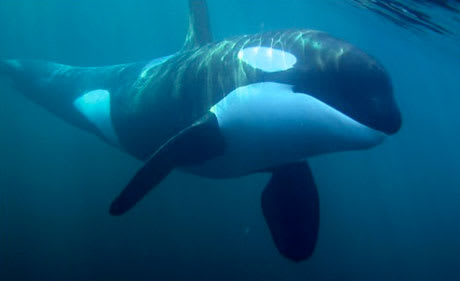Taking a cue from Suzanne Chisholm and Michael Parfit's saccharine documentary, The Whale, which is about Luna, a killer whale separated from its family on the West coast of Vancouver Island, the thing to do when your documentary doesn't succeed is to re-edit it, add a celebrity narrator and dole out some defensive responses to any criticism you received.
Back in 2007, the do-gooder duo released virtually the same documentary under the title Saving Luna, only Ryan Reynolds wasn't narrating and the tone wasn't quite as smug and solipsistic. But aside from the actual construction of the doc, which is exceedingly cloying and manipulative, the story of Luna is one of heartbreak and the inevitability of boundless human stupidity.
About a decade ago, the locals of Nootka Sound started seeing a young orca with a very friendly disposition. Since social killer whales aren't common in small communities, Luna quickly attracted media attention, drawing in tourists curious to touch and see the whale first hand. Before long, marine life specialists began to speculate about the dangers of domesticating a wild animal, or interfering with its natural progression, which led to a ban on interacting with the whale, which still demanded attention from passing boats and locals. What's more is that some undiscerning locals actually planned to kill the whale for damaging their boats, or what have you, while trying to play.
The end result was a clusterfuck of human stupidity, with media personalities jumping on different bandwagons while various specialists, First Nations representatives and political idealists all bitched, moaned and interfered with each other, trying desperately to win the battle of "rightness."
Handled without bias and with a bit of perspective, this story holds great substance and power, noting just how relentlessly narcissistic and limited in consciousness human beings really are. But unfortunately, this documentary exhibits the same myopic tendencies demonstrated by the very folks that convoluted the issue to begin with.
Instead of presenting the material factually, they have Reynolds repeatedly make sarcastic remarks about any perspective that doesn't match theirs. It's distracting and childish, making a very moving story something far less powerful than it should be.
(Kinosmith)Back in 2007, the do-gooder duo released virtually the same documentary under the title Saving Luna, only Ryan Reynolds wasn't narrating and the tone wasn't quite as smug and solipsistic. But aside from the actual construction of the doc, which is exceedingly cloying and manipulative, the story of Luna is one of heartbreak and the inevitability of boundless human stupidity.
About a decade ago, the locals of Nootka Sound started seeing a young orca with a very friendly disposition. Since social killer whales aren't common in small communities, Luna quickly attracted media attention, drawing in tourists curious to touch and see the whale first hand. Before long, marine life specialists began to speculate about the dangers of domesticating a wild animal, or interfering with its natural progression, which led to a ban on interacting with the whale, which still demanded attention from passing boats and locals. What's more is that some undiscerning locals actually planned to kill the whale for damaging their boats, or what have you, while trying to play.
The end result was a clusterfuck of human stupidity, with media personalities jumping on different bandwagons while various specialists, First Nations representatives and political idealists all bitched, moaned and interfered with each other, trying desperately to win the battle of "rightness."
Handled without bias and with a bit of perspective, this story holds great substance and power, noting just how relentlessly narcissistic and limited in consciousness human beings really are. But unfortunately, this documentary exhibits the same myopic tendencies demonstrated by the very folks that convoluted the issue to begin with.
Instead of presenting the material factually, they have Reynolds repeatedly make sarcastic remarks about any perspective that doesn't match theirs. It's distracting and childish, making a very moving story something far less powerful than it should be.




